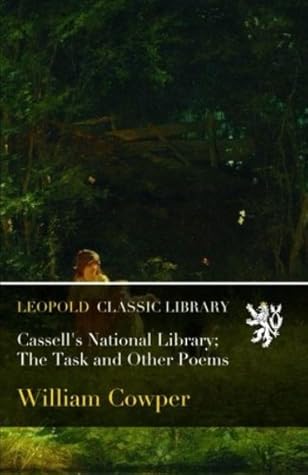- Bible
- Read the Bible
- Bible Versions
- Verse of the Day
- Reading Plans
- Verses by Topic
- Books of the Bible
- Bible Images
- Study
- Commentaries
- Concordances
- Dictionaries
- Encyclopedias
- Sermons
- Bible Atlas & Maps
- BP Wiki
- Devotionals
- Today's Devotionals
- Light of the World
- All Devotionals
- Inspirational Quotes
- More
- Picture Quotes
- Videos
- Inspirational
- Bible Study
- What The Bible Says
- Bible Q&As
- Daily Bread
- Bible by Genre
- Bible Stories
- Random Bible Verse
- Community
- Store
Cassell's National Library; The Task and Other Poems
Drama Anthologies present collections of plays that have been selected by a compiler. Examples include: Third Book of Short Plays, and The Passing Show: Five Modern Plays in Verse.
Drama Anthologies present collections of plays that have been selected by a compiler. Examples include: Third Book of Short Plays, and The Passing Show: Five Modern Plays in Verse. Also in this BookBooks that are Collections of Essays are anthologies of literary works by essayists. The list of essayists who have been active throughout the world and throughout time, is extraordinary.
Books that are Collections of Essays are anthologies of literary works by essayists. The list of essayists who have been active throughout the world and throughout time, is extraordinary. And in this BookBooks that contain a collection of Short Stories written by the same author include the following: Proverb stories, Spinning wheel stories, Fifty famous people, a book of short stories, Thirty More Famous Stories Retold, A House of Pomegranates, The Happy Prince and Other Tales, and The Trimmed Lamp, and Other Stories of the Four Million.
Books that contain a collection of Short Stories written by the same author include the following: Proverb stories, Spinning wheel stories, Fifty famous people, a book of short stories, Thirty More Famous Stories Retold, A House of Pomegranates, The Happy Prince and Other Tales, and The Trimmed Lamp, and Other Stories of the Four Million. About usLeopold Classic Library’s aim is to provide readers with the highest quality reproductions of fiction and non-fiction literature that has stood the test of time. Our titles are produced from scans of the original books and as a result may sometimes have imperfections. To ensure a high-quality product we have:
Leopold Classic Library’sLeopold Classic Library’s aim is to provide readers with the highest quality reproductions of fiction and non-fiction literature that has stood the test of time. Our titles are produced from scans of the original books and as a result may sometimes have imperfections. To ensure a high-quality product we have:thoroughly reviewed every page of all the books in the catalog
repaired some of the text in some cases, and
rejected titles that are not of the highest quality.
If You can't find the book You're looking for, please write to us. We will look for it in our catalog and find the best price for You in our eBay store.
If You can't find the book You're looking for, please write to us. We will look for it in our catalog and find the best price for You in our eBay store.If You can't find the book You're looking for, please write to us. We will look for it in our catalog and find the best price for You in our eBay store.Come home to the books that made a difference!
Come home to the books that made a difference!Come home to the books that made a difference!Thank you for your interest in our books!
Thank you for your interest in our books!BUY NOW
Published January 11th 2016 by Leopold Classic Library

William Cowper was an English poet and hymnodist. One of the most popular poets of his time, Cowper changed the direction of 18th century nature poetry by writing of everyday life and scenes of the English countryside. In many ways, he was one of the forerunners of Romantic poetry. Samuel Taylor Coleridge called him "the best modern poet", whilst William Wordsworth particularly admired his poem 'Yardley-Oak'.
Cowper suffered from severe manic depression, and although he found refuge in a fervent evangelical Christianity, the inspiration behind his much-loved hymns, he often experienced doubt and feared that he was doomed to eternal damnation. His religious sentiment and association with John Newton (who wrote the hymn "Amazing Grace") led to much of the poetry for which he is best remembered.
William Cowper was an English poet and hymnodist. One of the most popular poets of his time, Cowper changed the direction of 18th century nature poetry by writing of everyday life and scenes of the English countryside.
He was born in Berkhamsted, Hertfordshire, England. After education at Westminster School, he was articled to Mr. Chapman, solicitor, of Ely Place, Holborn, in order to be trained for a career in law.
Later he settled at Huntingdon with a retired clergyman named Morley Unwin and his wife Mary. Cowper grew to be on such good terms with the Unwin family that he went to live in their house, and moved with them to Olney, where John Newton, a former slave trader who had repented and devoted his life to the gospel, was curate. At Olney, Newton invited Cowper to contribute to a hymnbook that Newton was compiling. The resulting volume known as Olney Hymns was not published until 1779 but includes hymns such as "Praise for the Fountain Opened" (beginning "There is a fountain fill'd with blood") and "Light Shining out of Darkness" (beginning "God moves in a mysterious way") which remain some of Cowper's most familiar verses. Several of Cowper's hymns, as well as others originally published in the "Olney Hymns," are today preserved in the Sacred Harp.
Cowper was seized with dropsy in the spring of 1800 and died in East Dereham, Norfolk.
... Show more